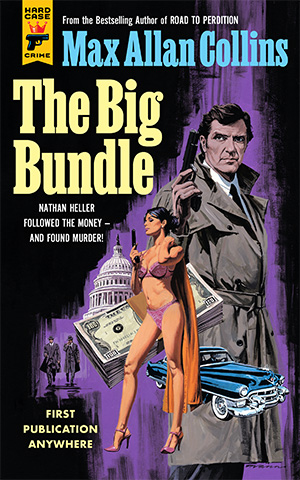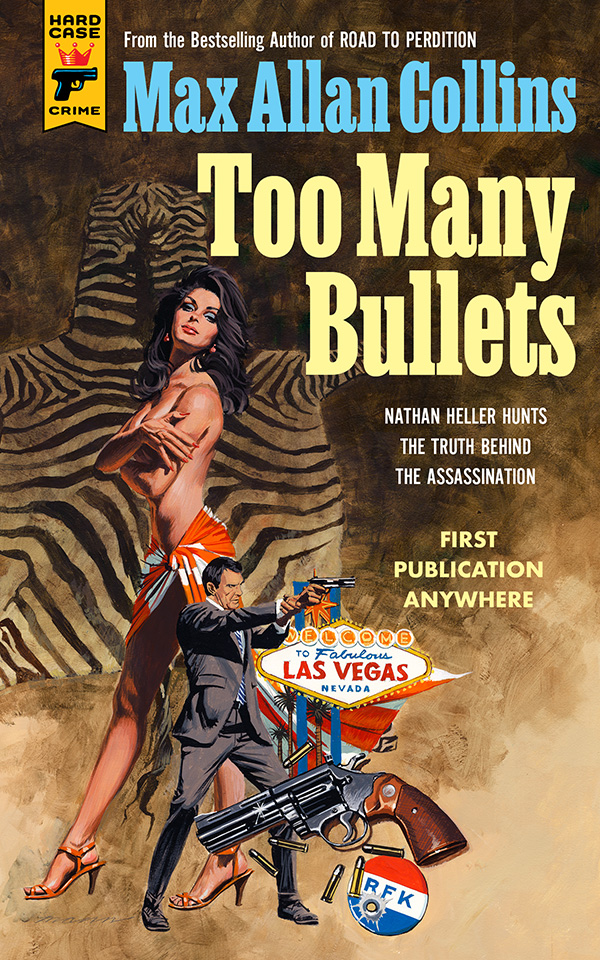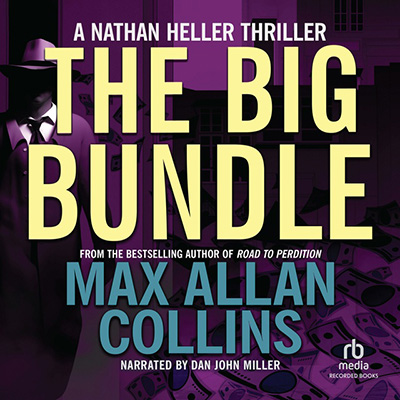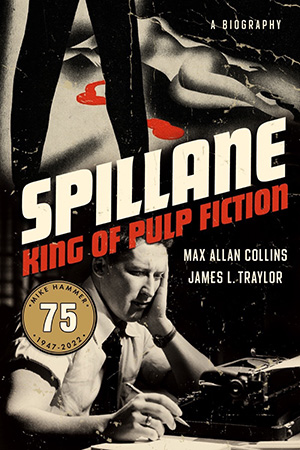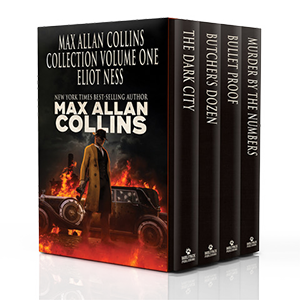I had hoped to do a book giveaway with copies of the Spillane bio, but I don’t have enough copies to do so – what I have has to go out to a handful of professional reviewers. Apologies.
But we do have a book giveaway this week – the new Nathan Heller, The Big Bundle, from Hard Case crime. I have ten trade paperbacks of the novel (which will be published initially in hardcover – these are ARC’s, Advance Reader’s Copies).
[All copies have been claimed. Thank you for your support! –Nate]
Because the physical copies of the book are tied up at the London docks, the novel won’t go on sale until some time in January. But the e-book is available Dec. 6 and the audio (indeed read by the great Dan John Miller!) is available now. So you should be able to post Amazon reviews as soon as you’ve read the book.
By the way, I received copies of the audio of The Big Bundle a few days ago, so it exists!
Speaking of which, here’s a spiffy review of The Big Bundle from the Considering Stories web site to whet your appetites:
MAX ALLAN COLLINS’ THE BIG BUNDLE
by Daniel Robichaud
When detective-to-the-stars Nathan Heller is called in to consult on the kidnap job in 1953, he’s got a few successes under his belt for work he’s done. The big marks on his record in terms of working kidnapping jobs was the work he did on the Lindbergh Baby case, which history has shown did not end at all well. Still, he’s a fresh set of eyes and ideas for the job, and the person or people who took Robert and Virginia Greenlease’s son Bobby from a boarding school are not exactly criminal masterminds. They snatched the kid just fine but walking the parents and the authorities through the ransom process has been trial after trial, with bumbling, idiocy, and amateurism on the kidnappers side. However, the ransom is the biggest on record so far: $600,000 in cash.
Well, Heller finds himself involved, but not as much as he might’ve wished. The FBI is calling the shots, when the local law is not interfering, and when Nate has the opportunity to wait for the perps and tail them or beat the answers out of them, he’s pulled away in an effort to save the kid’s life. By the novel’s midpoint, that particular mystery is mostly resolved: the fate of the kid is answered, the kidnappers are identified, and the money is recovered. Well, half of the money is recovered. The rest of the cash just vanishes into midair. All of that is historically correct, author Max Allan Collins finding gaps in real history to find a space for his fictional detective’s involvement along with some sly reworking of the facts and involved persons in order to make a satisfying narrative. As Westlake alluded in the opening of his tabloid-themed novel Trust Me On This, the real world seldom relies on plausibility while novelists are constrained by an audience’s suspension of disbelief.
One could consider the book to that point a rather involving work in its own right, but once that case is resolved, Collins really opens up the period and the scope, as parties are interested in figuring out just what happened to the missing cash. Fast forwarding to 1958, we find Senator Robert Kennedy convinced the money has made its way to the Teamsters via gangster connections—his Senate Rackets Committee is trying to find a platform to prosecute the leadership of that union. However, Teamsters leader Jimmy Hoffa believes the cash ended up in crooked hands. Both of these men want Nate Heller to go looking, and all roads lead him back to Saint Louis where the money disappeared in the first place.
It is there that Nate finds himself once again in crosshairs, people working angles and exploring various lines for locating the missing cash. Some familiar faces might know more than they are letting on, but all of them are interested in getting their own piece of the action, whether that’s a percentage of the missing fortune or a kickback. Will Nate find out what happened to all that boodle, or will he wind up one more victim, his career or even his life laid upon the sacrificial altar of mankind’s greed?
Max Allan Collins has been chronicling the life, times, and career of Nate Heller.
The Big Bundle is the eighteenth novel featuring the detective, though he’s also appeared in numerous short stories and novellas. Heller’s adventures kicked off with 1983’s True Detective (which takes place in the 1930s). The books are generally engaging historical thrillers, balancing good research, engaging characters, and twisty mysteries. This eighteenth volume is no exception, either.In
The Big Bundle, we find Heller in his late forties. He’s got enough experience to know how to handle himself, and he’s not as prone to the sorts of leaps that younger folks get up to—but he’s also not so old that he’s completely risk averse. There’s a measured quality to his embrace of trouble that is engaging. Here’s a guy who will still get in over his head, who better understands the stakes as well as his own abilities. It’s the perspective of age that makes this adventure all the more intriguing. In fact, Collins has never shied away from involving Heller in some major historical crimes and situations.The historical elements in
The Big Bundle are big headline stuff from the times, in fact. The details behind the Greenlease Kidnapping and its resolution are easily available to true crime afficionados, and the general beats of the case are unchanged here. Those in the know will not find surprises in the flow of the case itself, but Collins does inject his character into the scenario in unexpected ways. Because Nate Heller has a history with corruption himself, he’s just as often seen as a force of law and order as a tool of the Chicago mob, and this dual reputation gives him access to places and people that normal law enforcement cannot. Collins uses the duality quite nicely here. That he gets to engage with people on both side of the case is quite enjoyable.The later stuff takes a bit more license with history, using some big events and personalities as well as some created characters. It all rings just true enough that I don’t feel compelled to check a history book, which is how I most enjoy my historical fiction. A lived-in sense of the world, and a quirky perspective on the times are more enjoyable for me than a strict, dry, academic approach to the subject. Fans of James Kestrel’s
Five Decembers will find plenty to love in Collins’ playing with history. The Big Bundle is a straight-ahead suspense yarn, a pairing of mysteries nested comfortably in real world events, more or less.And though it is the eighteenth book in the Heller series, it stands on its own quite well. The first person narration hits on some of the events from past novels but does so without spoiling the secrets and suspense those books contain, inviting us to continue with the Heller series if we like the character here.
And there is plenty to appreciate. Nate Heller is a detective, and therefore a kind of knightly character committed to the resolution of mysteries. He’s not necessarily as righteous as Chandler’s Philip Marlowe, but he does walk down some mean streets. And given the aforementioned dual reputation, he’s as bound to rub elbows with racketeers or hoods as he is with honest citizens or law enforcement. In fact, Heller is a just character in terms of his understanding of right and wrong, as it applies to the way he operates and leads his life. But he also compartmentalizes this moral code while operating in a tough world.
The Big Bundle is a sprawling epic of mystery and suspense, a private eye story without any dames walking into offices but plenty of big, bad world to challenge our point of view character’s moral compass and detective skills. The book is bound to win new fans to the author’s series character, and one hopes Heller gets a bit of the same treatment as either Collins’ Quarry or Nolan characters, which both saw new releases as well as reissues of the earlier books in slick, new Hard Case Crime editions. The book is a dynamite read. The Big Bundle is available for pre-order in eBook, hardcover, and audiobook editions from the fine folks at Hard Case Crime. The earlier novels have appeared in affordable eBook, paperback, and audiobook editions along with much of the prolific author’s backlist.Check out the website here.
I have completed Too Many Bullets, the even newer Nathan Heller novel (out some time next year), and thanks to my indefatigable editor at Hard Case Crime, Charles Ardai, it’s really completed. Charles is blazingly fast, at least with my books. As almost a practical joke, I sent the novel out on Wednesday before Thanksgiving, saying it was just in time to ruin the long holiday weekend.
Well, Charles had finished his read-through and had all his notes…Friday morning! I spent the day dealing with his notes and fixing typos and such he’d spotted (and I’m pleased, even proud to say he likes the novel a lot). And now, with the ink barely dry…the novel is finished. Really finished.
Charles and I even worked on the backcover copy, which will also appear on the HCC web site.
All that remains is, at some point, a proof-reader to go through it and I’ll have a few questions to answer. Understand that this process can take months. And months. To finish a novel and two days later be doing the corrections and editorially requested tweaks is…astonishing.
Now I feel a little lost. I puttered around Saturday not knowing what to do with myself. This is a common feeling I have when I finish writing a book. I am working my ass off to finish it, then…what am I to do with myself?
I am taking most of December off from novel writing – I will have my draft of Antiques Faux to write come January. But I will be working on the video edit of the Mike Hammer play with Gary Sandy, Encore for Murder. I’ve seen the first act of two from editor Chad Bishop, and I like it. Not sure what to do with it, since it is after all an amateur production…though Gary, a real pro, is at its center; and the local cast seems pretty darn good to me.
As you may recall, this is a radio-style production, scripts in hand, though there is costuming and a big screen for scene-setting slides. We did this professionally, twice, in Owensboro and Clearwater, and I think this one stacks up nicely.
One idea I have is to include it as a bonus feature on the proposed disc of the expanded documentary, Mike Hammer’s Mickey Spillane, which is in progress.
A movie recommendation and a Blu-ray recommendation….

The Menu (in theaters now) is an excellent black comedy with a strong cast led by Ralph Fiennes and Anna Taylor-Joy (in probably her best post-Queen’s Gambit role). Writer Seth Reiss is a veteran of the Onion and Comedy Bang! Bang!, his co-writer Will Tracy comes from Succession. Those credits make a lot of sense, because The Menu is very funny and very dark. The critics have mostly liked it, but miss the point by focusing on the film as a satire on the foodie culture when it’s much more about class in general.
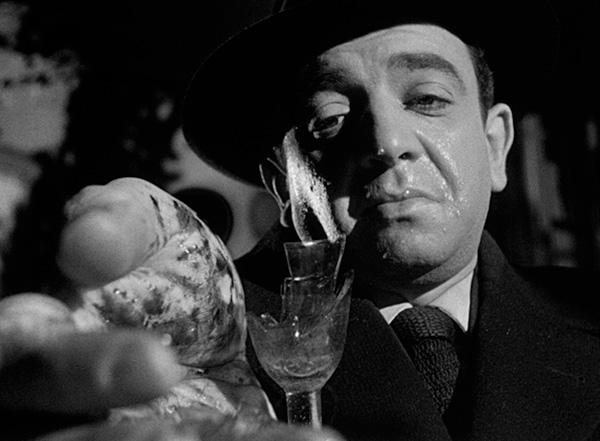
From Flicker Alley on Blu-ray comes El Vampiro Negro, another outstanding Eddie Muller discovery, the best yet of the South of the Border noirs he’s dug up (which is saying something). Despite the “Vampiro,” this is not a horror film – rather, amazingly, it’s a remake of Fritz Lang’s seminal crime thriller M (1931), in which Peter Lorre made himself known to the world in all his creepy glory. M is one of the great movies, and it spawned a strong American remake of the same title by director Joseph Losey, a film doomed to be underrated.
What is amazing about El Vampire Negro is that it rivals the original and, in my admittedly skewed view (but one that Muller agrees with), is my favorite of the three versions. It just might be superior to the original. (Muller agrees.)
While Negro has familiar elements from Lang – the whistling by the serial killer of “Hall of the Mountain King,” for instance – it has an entirely new twist by putting women…the mothers of the little girl victims…at the center of the narrative. The main character, nowhere to be seen in M, is a chanteuse (Olga Zubarry) in a seedy nightclub. Madame Zubarry is excellent, alternately recalling young Marilyn Monroe and Gloria Graham. The seeming hero, a pillar of law enforcement, is a bully and a creep (though humanized by his love for his crippled wife). The shadows and Dutch angles are superbly rendered. This is a genuine noir find.
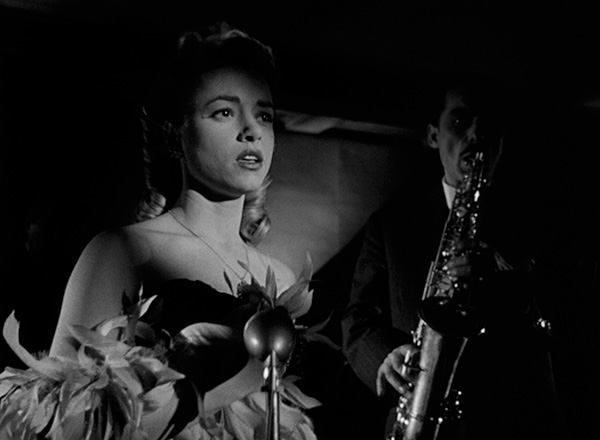
Rod Lott, guru of Bookgasm, also has the Flick Attack movie site, where he talks about I, the Jury (1953) and does so intelligently.
M.A.C.
